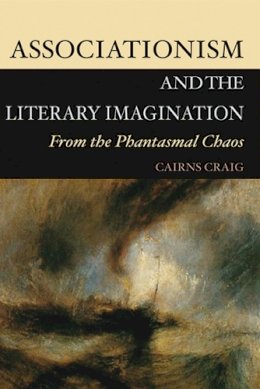
Stock image for illustration purposes only - book cover, edition or condition may vary.
Associationism and the Literary Imagination: From the Phantasmal Chaos
Craig Cairns
€ 121.33
€ 119.42
FREE Delivery in Ireland
Description for Associationism and the Literary Imagination: From the Phantasmal Chaos
Hardback. Provides an account of the philosophical and psychological theories in the British empiricist tradition that provoked some of the most radical changes in literary form between the eighteenth and the twentieth centuries. Num Pages: 336 pages, None. BIC Classification: 2AB; DSBD. Category: (P) Professional & Vocational. Dimension: 241 x 162 x 23. Weight in Grams: 634.
Associationism and the Literary Imagination traces the influence of empirical philosophy and associationist psychology on theories of literary creativity and on the experience of reading literature. It runs from David Hume's Treatise of Human Nature in 1739 to the works of major literary critics of the twentieth century, such as I.A. Richards, W.K. Wimsatt and Northrop Frye. Cairns Craig explores the ways in which associationist conceptions of literature gave rise to some of the key transformations in British writing between the romantic and modernist periods. In particular, he analyses the ways in which authors' conceptions of the form of their readers' aesthetic experience led to radical developments in literary style, from the fragmentary narrative of Sterne's Tristram Shandy in 1760 to Virginia Woolf's experiments in the rendering of characters' consciousness in the 1920s; and from Wordsworth's poetic use of autobiography to J.G. Frazer's exploration of a mythic unconscious in The Golden Bough. Detailed analyses are offered of the ways in which a wide variety of major British writers, including Scott, Lady Morgan, Dickens, Tennyson, Hardy, Yeats, Joyce and Woolf developed their literary techniques on the basis of associationist conceptions of the mind, and of how modern literary criticism - from Arthur Symons to Roland Barthes - is founded on associationist principles. Associationism and the Literary Imagination relocates the traditions of British writing since the eighteenth century within the neglected context of its native empirical philosophy, and reveals how many of the issues assumed to be products of 'postmodern' or 'deconstructive' theory have long been foregrounded and debated within the traditions of British empiricism. This is a work which provides a radical new perspective on the history of literature in Britain and Ireland and challenges many of the assumptions of contemporary theoretical debate about the nature of literary experience and critical judgement. Key Features * Covers a range of writers from Laurence Sterne to Virginia Woolf and a range of theorists from David Hume to I. A. Richards; * Offers new ways of appreciating the relation of philosophy/psychology to literary creativity and of understanding the development of modern criticism in Britain and America; * Relocates British writers within a native philosophical tradition.
Product Details
Publisher
Edinburgh University Press
Number of pages
336
Format
Hardback
Publication date
2007
Condition
New
Number of Pages
336
Place of Publication
Edinburgh, United Kingdom
ISBN
9780748609123
SKU
V9780748609123
Shipping Time
Usually ships in 5 to 9 working days
Ref
99-50
About Craig Cairns
Cairns Craig is Director of the AHRC Centre for Irish and Scottish Studies at the University of Aberdeen. His books include Yeats, Eliot, Pound and the Politics of Poetry (1982), Out of History (1996), The Modern Scottish Novel (1999), Associationism and the Literary Imagination (2007). He was general editor of the four-volume History of Scottish Literature (1987-9) and has been on the editorial boards of Cencrastus, Radical Scotland, Edinburgh Review and the Journal of Irish and Scottish Studies
Reviews for Associationism and the Literary Imagination: From the Phantasmal Chaos
